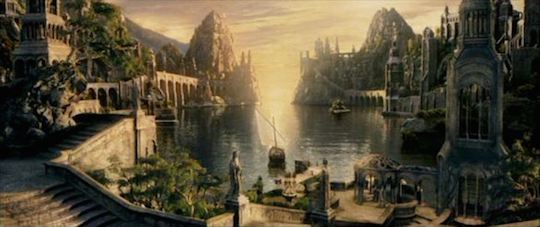We run our website the way we wished the whole internet worked: we provide high quality original content with no ads. We are funded solely by your direct support. Please consider supporting this project.
Of Revelation and The Lord of the Rings

Image via Abnormal Anabaptist
As most of you know, Greg has been preaching a sermon series on the book of Revelation. He’s got a very different take on this book than the popular Christian culture that sprouted the Left Behind series. Greg argues that John takes all of the violent images of his day and turns them on their head to reveal Jesus as the Lamb of God who conquers with his own death rather than the death of his enemies. If you haven’t had a chance to listen to them, it would be well worth your time.
Robert Martin wrote a reflection on how this series is changing the way he thinks about this topic. Robert is a big fan of The Lord of the Rings, and he uses this story as a way to illustrate his change in thinking. Brilliant and inspiring.
Here’s a little snippet of his blog post, but you’ll want to check out the entire post to fully get his point.
For those in Middle-Earth who stop looking to the past and look, instead, towards this future, the strivings take on a different tone. No longer are they striving to regain the past. Instead, they are aiming to capture a little bit of that future in the present. There is a hope that they have that comes, not from attempting to regain something lost, but from trying to attain something that is yet to gain. And it is that “not yet” that causes them to make amazing sacrifices.
This is captured in probably one of the more poignant scenes in the movie. The actual words take place a lot earlier in the novels, but Gandalf and Pippin, faced with imminent death, faced with a hopelessness of “why bother if this is the end”, have a moment where Gandalf describes the hope, a hope that he, actually, has seen. Watch this:
Category: General
Tags: Book of Revelation, Eschatology, Hope, Left Behind, Lord of the Rings, Robert Martin
Related Reading

The Warfare We Have Inherited
Image by Chris Sardegna Jesus’ miracles over nature, as well as his healings, exorcisms and especially his resurrection, were definite acts of war that accomplished and demonstrated his victory over Satan. These acts routed demonic forces and thereby established the kingdom of God in people’s lives and in nature. But their primary significance was eschatological. People…

How Revelation Uses Violent Images in an Anti-Violent Way
All the violent scenes in Revelation are symbols for the battle of truth and deception. They never involve literal violence. In fact, they symbolize ANTI-VIOLENCE. The ingenious way John helps us get free of deception of trust in violent power is by taking a standard violent symbol and juxtaposing it with a symbol that undermines…

God, Why You So Harsh in Revelation? (podcast)
Greg talks about Jezebels and beds of suffering. Episode 512 http://traffic.libsyn.com/askgregboyd/Episode_0512.mp3

The Victory is Already Won, But Not Yet
Christ came “to destroy the works of the devil” (1 John 3:8), to disarm “the rulers and authorities” (Col 2:15), and to “destroy the one who has the power of death, that is, the devil (Heb 2:14). The result of this victory is that he is seated on his rightful throne, the whole cosmos is…

What the New Testament Says about Annihilation
Yesterday, we posted a piece on annihilationism and how this view interprets passages that seem to point to eternal punishment in hell. (Click here for yesterday’s post.) Today’s post speaks to teaching in the New Testament that annihilationists say support this view: Consuming fire. John the Baptist proclaimed “every tree … that does not bear…

Responding to Driscoll’s “Is God a Pacifist?” Part I
I’m sure many of you have read Mark Driscoll’s recent blog titled “Is God a Pacifist?” in which he argues against Christian pacifism. I’ve decided to address this in a series of three posts, not because I think Driscoll’s arguments are particularly noteworthy, but because it provides me with an opportunity to make a case against what I’ve…
